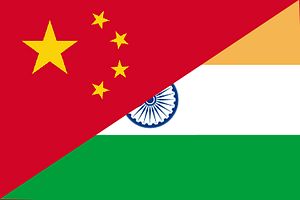Xi Jinping arrived in New Delhi to begin the most significant leg of his tour of South Asia, which also included stops in Sri Lanka and the Maldives. His three-day trip to India will mark the first by a Chinese president in eight years and the third such visit overall. Xi was received by Indian Prime Minister Narendra Modi in Ahmedabad, Gujarat. Modi’s decision to receive Xi in his home state breaks with tradition; most foreign leaders are received in New Delhi. Xi’s arrival also coincided with Modi’s 64th birthday. Xi’s visit to India could set the tone for a new normal in India-China bilateral ties.
Despite strategic mistrust and economic imbalance in the bilateral relationship, India-China relations continue to hold massive potential for both sides. Beijing in particular took Narendra Modi’s election victory back in May as a sign that India would finally get its economic house in order and immediately seized upon the opportunity for closer relations. Back then, Xi Jinping dispatched Chinese foreign minister Wang Yi to India as his personal envoy. During Wang’s visit, the Chinese side emphasized the opportunities presented for developing bilateral ties under the leadership of India’s Bharatiya Janata Party (BJP) government.
Modi, meanwhile, has proven himself to be quite the foreign policy dynamo. He wasted little time in his first hundred days when it came to bolstering India’s engagement in its neighborhood (with Nepal and Bhutan), with important partners (Japan), and even multilateral institutions (the BRICS). Modi met Xi in an encouraging meeting on the sidelines of the BRICS summit in Fortaleza, Brazil. The two leaders demonstrated a good rapport then.
As they meet again, in India this time, each of them is aware of the complementarities that are available for exploitation. China has made it known that it is willing to act as a source of considerable funding for Indian infrastructure projects. Xi may even begin discussions with India for a civil nuclear cooperation deal during this visit. In an op-ed titled “Towards an Asian century of prosperity” in India’s Hindu, Xi Jinping described the India-China economic relationship as a “combination of the world’s factory and the world’s back office,” alluding to China’s manufacturing advantage and India’s services advantage respectively. Recognizing that the $30 billion trade imbalance between the two countries is an issue of concern for Indian leaders, he proposed opening the vast Chinese market for Indian firms as a measure to address the imbalance. To be sure, the material benefits of closer relations with China are India’s for the taking should it choose to do so.
However, for New Delhi, relations with China are never entirely decoupled from the deep strategic mistrust that permeates the environment around their mutual border where the two are engaged in two separate territorial disputes. New Delhi and Beijing continue to wrangle over the sovereignty of Aksai Chin (a Chinese-administered territory adjacent to India-administered Kashmir) and Arunachal Pradesh (an Indian-administered state that China claims almost in its entirety). Just prior to Xi’s visit, Indian troops in Kashmir faced off with 200 Chinese People’s Liberation Army (PLA) soldiers who crossed the Line of Actual Control (LoAC), the bilaterally-determined line delineating Indian-administered territory from Chinese-administered territory. The incident did not quite reach the scale of the 2013 Daulat Beg Oldie incident — a three week stand-off between Indian and Chinese troops that occurred right before Chinese Premier Li Keqiang’s trip to New Delhi.
Still, despite this strategic mistrust, the two countries will likely continue to build their relationship on a foundation of economic cooperation. Xi and Modi are expected conclude a deal on Thursday that will see over $100 billion in Chinese investment flow into India, dwarfing the recent $34 billion package Japan offered India. The two leaders may additionally discuss security issues, such as how New Delhi and Beijing can cooperate in Afghanistan following the withdrawal by NATO and U.S. troops at the end of this year. Earlier this summer, China invited India to attend the next summit of the APEC trade group, as well as inviting New Delhi to join in its Maritime Silk Road initiative — something that has been a major focus of Xi’s South Asia trip so far.

































